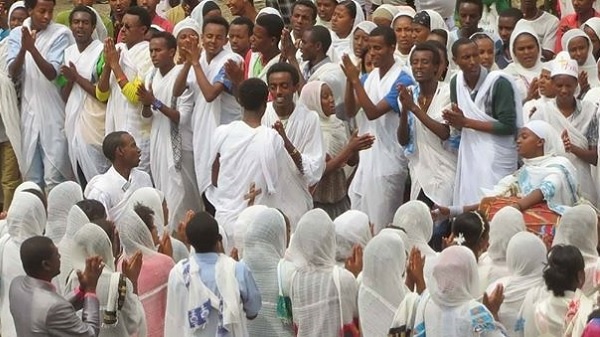
Timket, Ethiopia’s Feast of Epiphany, is one of the highest and holiest holidays in the Ethiopian Orthodox Christian calendar and is celebrated on 19th January every year (on 20th January if it is a leap year). This year as usual, millions of Ethiopians will celebrate the holiday in enthusiastic style with three days of festival, beginning on the eve of Timket with awe-inspiring processions.
Timket is the celebration the baptism of Jesus Christ in the Jordan River. Jesus Christ’s pre-baptism story starts when he, the then referred to as Jesus of Nazareth, was hailed by many as that long-awaited Messiah. His earthly ministry was marked by baptism in the Jordan River. Ever since, Ethiopian Orthodox churches have treasured and closely guarded their own model, or a replica, of the Ark of the Covenant, called a tabot. The tabot only leaves the church during Timket, when it’s carried with great pomp to a nearby pool or river and immersed, along with many of the Christian faithful, in commemoration of Christ’s baptism.
Ketera: 18th January
The celebration of Timket starts on the afternoon of 18th January, known as ‘Ketera’, the day when the tabot from each church makes procession, accompanied by priests, church’s followers and tourists, to the place where Timket will be celebrated the next day. The place is usually the nearest river, lake or pond where prayers and the communal baptism will be taken place by the priests on Timket.
The procession is attended by chanting and dancing crowds in dazzling white traditional dress, which contrasts with the colors of the ceremonial robes and sequined velvet umbrellas of the priests. The tabots stay overnight near the water and ceremonies continue overnight.
Timket/ Epiphany: 19th January
The main Timket celebration starts the next morning, when the ceremony begins with pre-sunrise rituals, which include Kidan (Morning Prayer), Mahlét (Hymn), Qidassie (Morning Mass), and Wereb (EOTC’s special singing). Then follows the blessing and sprinkling of blessed water on the assembled congregation in commemoration of Christ’s baptism in the hands of John the Baptist, symbolizing a resurrection to a new life in Christ, according to Christians’ belief.
It takes the better part of the day before the procession breaks up to return the Tabots to their respective churches in the afternoon. By afternoon, all the Tabots (except the Tabot from St. Michael’s Church, if there exists in that vicinity), are returned to their churches in a procession with the priests and young people animated and leaping like King David in the Bible.
St. Michael the Archangel’s Day: 20th January
While the other Tabots return to their church on 19th January, the Tabot consecrated in the name of St. Michael the Archangel remains until next day, i.e. 20th January. This day (that is, the 12th day of each month in Ethiopian calendar) is basically the feast day of St. Michael the Archangel and the 20th January (which is the 12 day of the 5th month on Ethiopian calendar) is celebrated with special attention and festivity On this day, the Tabot from St. Michael’s church returns to its dwelling church accompanied by a cheerful crowd.
Places
Timket is celebrated across the country, but many – especially foreign tourists – consider that Gondar offers the best experience. CNN contributors Daisy Carrington and Aja Harris express the relevance of Gondar in the celebration of Timket as, “France has Lourdes, India has the Ganges and Ethiopia, meanwhile, has Gondar.”
In Gondar, the three-day affair starts with smaller ceremonies at eight different churches. Then, eight colorful parades of choirs and priests – accompanied by Gondar’s entire population, it seems – begin blending like a river’s tributaries until they meet at the piazza. Their final destination is Fasilides’ Bath, about 2 km away.
Timket is also celebrated in Addis Ababa at Jan Meda (the horse-racing track of imperial days) and in Axum, at the Bath of the Queen of Sheba.
What is unique about it?
The Ethiopian Orthodox Church has celebrated Timket since the fourth century. This three-day observance is a study in contrasts: deep solemnity of faith intermixed with exuberance make it unique; it differs from other epiphany celebrations across the world.
Significance
For Ethiopians, Timket/ Epiphany is the most important religious festival of the year, and traditionally, it is known as an important occasion for young adults to choose their would-be lovers.
On 11 December 2019, the United Nations Educational, Scientific and Cultural Organization (UNESCO) inscribed Timket/ Ethiopia Epiphany as one the Intangible Cultural Heritage of Humanity.
Ethiopia wears its ancient past with pride in the many festivals observed such as Genna (Christmas), Meskel (Finding the True Cross), Enkutatash (Ethiopian New Year), Fasika (Easter), and Muslims’ religious festivities, such as Mawlid and the Day of Arafah.
Sources: Ethiopian Embassy in UK & Selamta Magazine
